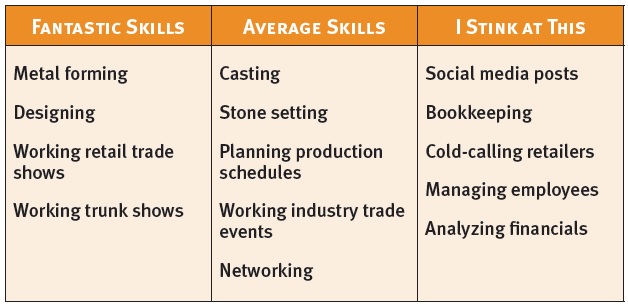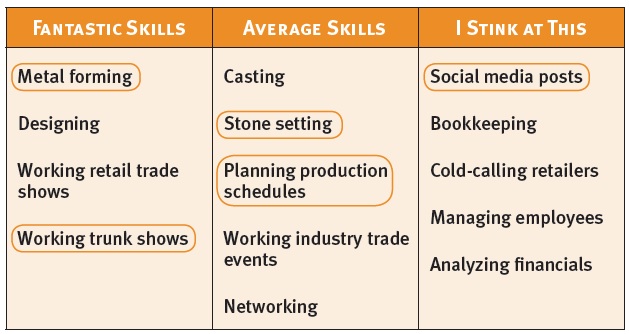Clear Expectations Help You Release Control
One of the things I like to write about is how to get out of our own way, and how most people get in their own way by fearing change and trying new things. But what if you like change, you embrace learning new things, and you’re still stuck? Then it’s possible you’re suffering from one or both of the other two reasons we get in our own way: a need to control everything, or sacrificing good for the perfect.
I know a business owner who is quite the Renaissance Man. His ability to come up with w ideas, to imagine how things could be made, and to create innovative manufacturing techniques to make them is inspiring. Unfortunately, his need to control everything stands in his way of success. The business is too big to be run by one person, yet he won’t let the employees he has contribute in meaningful ways. He manages their activities to such a degree that the entire company is in a state of rigor mortis – unable to move until the owner puts his stamp of approval on the tiniest of details. Whatever creativity and intelligence the employees did or could bring to the table has been undermined, because the organization has been trained not to think or make decisions without the boss.
I can tell stories of dozens of business owners who are one-person shops long past the point when they should have expanded, simply because they don’t want to let go of the control they enjoy when they do everything themselves.
If you’re a small business and you’re making the amount of money you want to make and getting the amount of free time you need to be a balanced human, you’re just fine the way you are. But if you’re feeling stuck, needing to grow but afraid to trust anyone else with your details, here are a few tips for getting out of your own way.
Assess Yourself
Start by making a brutally honest list of your skills. This list must be based entirely on the here-and-now. No “If I took a day and really worked on it I could be great at it” thinking. Just hard, cold facts. Take a piece of paper, and make three columns. At the top of the columns write the headings “Fantastic Skills,” “Average Skills,” and “I stink at this.” It looks like this:

A genuine control freak will look at this list and immediately make plans for perfecting everything in the Average Skills and I Stink at This columns. But that’s not rational. Don’t get me wrong – self-improvement is one of the most exciting parts of living. But here’s a business fact that you must accept:
No business has unlimited resources. Your resources will always fall short of being sufficient to accomplish everything your business needs and wants to do.
This is true whether you are a one-person operation or General Electric. Attempts to become the master of every possible business skill will only steal time and attention from doing the things that are already your strengths. So what you must do is learn to set clear expectations - of yourself and others - and learn to delegate (which could include outsourcing).
Which Skills are Strategic?
Once you have completed your personal skills list, take out a red pen. Circle the elements that are the most important to your business strategic success. Everything on our example list is important for a business to do well, but which are the most strategic? The most tied with your special value to your customers, your secret-sauce of strategic differentiation? Imagine for a moment that the example business is a design firm that:
- Offers jewelry with a very unique metal finish
- Uses unique and difficult-to-set gemstones
- Works closely with retailers to attract customers and sell through event-based marketing.
The essential strategic skills for that company might look like this:

Unless you happen to have a lot of free time on your hands, you could probably choose to perfect one of the three things you aren’t fantastic at. But what about the other two?
Here’s an interesting little paradox. Many times, the tasks and responsibilities we won’t let go of are the ones that we don’t do well ourselves. Why? I’m not sure it’s ever been studied, but I have my guesses based on decades of observation. I think the reason is that it’s hard to delegate – and even harder to manage – something that we are not good at ourselves. We’d rather muddle through in an attempt to control the mistakes. But by setting clear expectations, it's possible to eliminate the mistakes and hand off the things you're not good at and/or which are not strategic.
But controlling for mistakes is a zero-sum game. You can’t soar when you’re spending all your time trying not to fall. So here is a method you can use to get control – and then let go of it.
- If you feel the need to move one of your strategic skills into your “fantastic” column, choose it and commit to it. You only get one, so choose wisely based on your innate capabilities and talents and your level of interest.
- For each of the remaining strategic skills, make a list of the required outcomes, the things that absolutely must be accomplished to satisfy the business need from that element. Let’s use “Planning Production” for our example
What must be accomplished in the area of Planning Production?
- All initial orders from retailers must be completed in 4 weeks
- All reorders from retailers must be completed in 1 week
- We must know the status of every order at all times
- We must maintain a quality approval rate (final quality) of 99% or higher
This simple act of defining outcomes for an aspect of your business places the control where it should be – at the beginning, at the level of expectations. Once you have established these expectations, you will feel freer to trust someone else to do the work, whether it is an employee or an outsource partner.
In fact, this is the key to success in all business functions. If you take the time to define precisely what you want from each function in your business, you can manage to expectations rather than micromanaging the work itself.
This is ultimately the work of a business owner. To define what is important in every area of your business, make those expectations clear to all employees and service providers, then monitor the results. Doing this work will provide tremendous clarity. It will also free you to focus on the things you are really really good at, which are most likely also the things you love to do.
##











